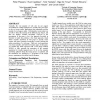Free Online Productivity Tools
i2Speak
i2Symbol
i2OCR
iTex2Img
iWeb2Print
iWeb2Shot
i2Type
iPdf2Split
iPdf2Merge
i2Bopomofo
i2Arabic
i2Style
i2Image
i2PDF
iLatex2Rtf
Sci2ools
117
click to vote
WWW
2005
ACM
2005
ACM
Accessibility: a Web engineering approach
Currently, the vast majority of web sites do not support accessibility for visually impaired users. Usually, these users have to rely on screen readers: applications that sequentially read the content of a web page in audio. Unfortunately, screen readers are not able to detect the meaning of the different page objects, and thus the implicit semantic knowledge conveyed in the presentation of the page is lost. One approach described in literature to tackle this problem, is the Dante approach, which allows semantic annotation of web pages to provide screen readers with extra (semantic) knowledge to better facilitate the audio presentation of a web page. Until now, such annotations were done manually, and failed for dynamic pages. In this paper, we combine the Dante approach with a web design method, WSDM, to fully automate the generation of the semantic annotation for visually impaired users. To do so, the semantic knowledge gathered during the design process is exploited, and the annota...
Related Content
| Added | 22 Nov 2009 |
| Updated | 22 Nov 2009 |
| Type | Conference |
| Year | 2005 |
| Where | WWW |
| Authors | Peter Plessers, Sven Casteleyn, Yeliz Yesilada, Olga De Troyer, Robert Stevens, Simon Harper, Carole A. Goble |
Comments (0)

